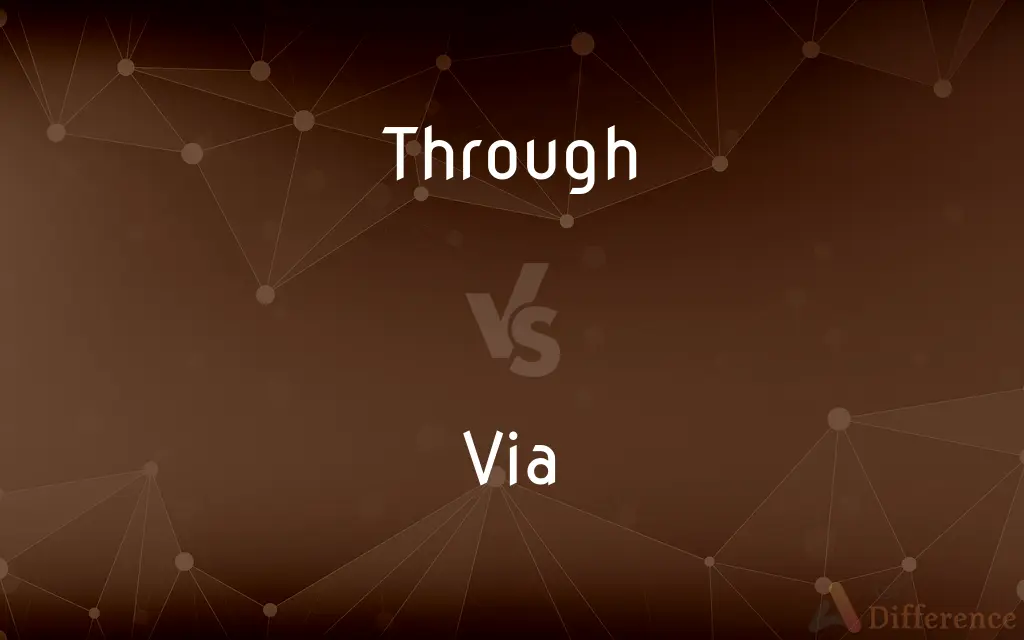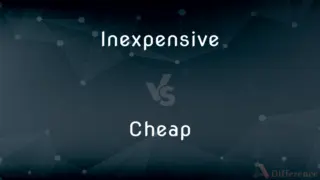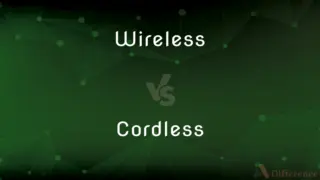Through vs. Via — What's the Difference?
Edited by Tayyaba Rehman — By Fiza Rafique — Updated on September 21, 2023
"Through" and "via" both indicate a means or method by which something is achieved or a path is taken. "Through" often suggests a process or journey, while "via" usually implies a more specific route or medium.

Difference Between Through and Via
Table of Contents
ADVERTISEMENT
Key Differences
The terms "through" and "via" are often used interchangeably to indicate the way something is accomplished or a path is taken, but they carry subtle differences. "Through" is generally used to suggest a process, an experience, or a journey that has multiple steps or phases. "Via," on the other hand, is more specific and usually denotes a particular route, method, or medium.
For example, if you say "I learned cooking through practice," it implies a process and the experience that came with it. If you say "I learned cooking via YouTube videos," it indicates the specific medium through which you gained your skills.
In travel contexts, "through" often implies a journey where multiple locations or points are involved. "Via" implies that you are mentioning a specific location that is part of a larger route. For instance, "I am traveling through Europe" suggests an extended journey with multiple stops, whereas "I am traveling to Paris via London" indicates a specific layover or transfer point.
Another difference between "through" and "via" is grammatical structure. "Through" can serve as a preposition, an adverb, or an adjective. "Via," on the other hand, primarily serves as a preposition. "Through" can fit into more diverse sentences due to its broader grammatical role, while "via" is more limited.
Comparison Chart
General Usage
Indicates a process or journey
Indicates a specific route or medium
ADVERTISEMENT
Contextual Flexibility
Can be used in a variety of contexts
Usually more specific and focused
Grammatical Role
Preposition, adverb, adjective
Primarily a preposition
Example Context
"I went through the tunnel"
"I went to the city via the tunnel"
Implied Complexity
May imply multiple steps or phases
Usually indicates a single, straightforward step
Compare with Definitions
Through
Indicates a process or series of actions.
He learned to read through practice.
Via
Signifies a particular medium or channel.
I received the information via email.
Through
Used to denote movement from one point to another.
I walked through the park.
Via
Indicates a specific method or means.
The project was completed via teamwork.
Through
Signifies completion or accomplishment.
She read the entire book through.
Via
Indicates a specific route or pathway.
We drove via the scenic route.
Through
Indicates an extended period of time.
He worked through the night.
Via
Used to denote a specific intermediary location.
I traveled to New York via Chicago.
Through
In one side and out the opposite or another side of
Went through the tunnel.
Via
Used to specify an origin.
The parcel came via air mail.
Through
Among or between; in the midst of
A walk through the flowers.
Via
By way of
Went to Pittsburgh via Philadelphia.
Through
By way of
Climbed in through the window.
Via
By means of
Sent the letter via airmail.
Through
By the means or agency of
Bought the antique vase through a dealer.
Via
A main road or highway, especially in ancient Rome. (Mainly used in set phrases, below.)
Through
Into and out of the handling, care, processing, modification, or consideration of
Her application went through our office. Run the figures through the computer.
Via
(electronics) A small hole in a printed circuit board filled with metal which connects two or more layers.
Through
Here and there in; around
A tour through France.
Via
By way of; passing through.
They drove from New York to Los Angeles via Omaha.
You can enter the building via the western gate.
Through
From the beginning to the end of
Stayed up through the night.
Via
By (means of); using.
I'll send you the information via e-mail.
Through
At or to the end of; done or finished with, especially successfully
We are through the initial testing period.
Via
(obsolete) Away! Be off!
Through
Up to and including
A play that runs through December.
A volume that covers A through D.
Via
A road or way.
Through
Past and without stopping for
Drove through a red light.
Via
By the way of; as, to send a letter via Queenstown to London.
Through
Because of; on account of
She succeeded through hard work. He declined the honor through modesty.
Through
From one end or side to another or an opposite end or side
Opened the door and went through.
Through
From beginning to end; completely
I read the article once through.
Through
Throughout the whole extent or thickness; thoroughly
Warmed the leftovers clear through.
Got soaked through in the rain.
A letter that was shot through with the writer's personality.
Through
Over the total distance; all the way
Drove through to their final destination.
Through
To a conclusion or an accomplishment
See a matter through.
Through
Allowing continuous passage; unobstructed
A through street.
Through
Affording transportation to a destination with few or no stops and no transfers
A through bus.
A through ticket.
Through
Continuing on a highway without exiting
Through traffic.
Through lanes.
Through
Passing or extending from one end, side, or surface to another
A through beam.
Through
Having finished; at completion
She was through with the project.
Through
Having no further concern, dealings, or connection
I'm through with him.
Through
Having no more use, value, or potential; washed-up
That swimmer is through as an athlete.
Through
Doomed to death or destruction.
Through
From one side of an opening to the other.
I went through the window.
Through
Entering, then later leaving.
I drove through the town at top speed without looking left or right.
Through
Surrounded by (while moving).
We slogged through the mud for hours before turning back and giving up.
Through
By means of.
This team believes in winning through intimidation.
Through
In consequence of; as a result of.
Through
(North America) To (or up to) and including, with all intermediate values.
From 1945 through 1991;
The numbers 1 through 9;
Your membership is active through March 15, 2013
Through
Passing from one side of something to the other.
Interstate highways form a nationwide system of through roads.
Through
Finished; complete.
They were through with laying the subroof by noon.
Through
Without a future; done for.
After being implicated in the scandal, he was through as an executive in financial services.
Through
No longer interested; wearied or turned off by experience.
She was through with him.
Through
Proceeding from origin to destination without delay due to change of equipment.
The through flight through Memphis was the fastest.
Through
(association football) In possession of the ball beyond the last line of defence but not necessarily the goalkeeper; through on goal.
Through
From one side to the other by way of the interior.
The arrow went straight through.
Through
From one end to the other.
Others slept; he worked straight through.
She read the letter through.
Through
During a period of time; throughout
He worked through the night.
Through
To the end.
He said he would see it through.
Through
Completely.
Leave the yarn in the dye overnight so the color soaks through.
Through
Out into the open.
The American army broke through at Saint-Lô.
Through
A large slab of stone laid in a dry-stone wall from one side to the other; a perpend.
Through
(obsolete) A coffin, sarcophagus or tomb of stone; a large slab of stone laid on a tomb.
Through
From end to end of, or from side to side of; from one surface or limit of, to the opposite; into and out of at the opposite, or at another, point; as, to bore through a piece of timber, or through a board; a ball passes through the side of a ship.
Through
Between the sides or walls of; within; as, to pass through a door; to go through an avenue.
Through the gate of ivory he dismissedHis valiant offspring.
Through
By means of; by the agency of.
Through these hands this science has passed with great applause.
Material things are presented only through their senses.
Through
Over the whole surface or extent of; as, to ride through the country; to look through an account.
Through
Among or in the midst of; - used to denote passage; as, a fish swims through the water; the light glimmers through a thicket.
Through
From the beginning to the end of; to the end or conclusion of; as, through life; through the year.
Through
From one end or side to the other; as, to pierce a thing through.
Through
From beginning to end; as, to read a letter through.
Through
To the end; to a conclusion; to the ultimate purpose; as, to carry a project through.
Through
Going or extending through; going, extending, or serving from the beginning to the end; thorough; complete; as, a through line; a through ticket; a through train. Also, admitting of passage through; as, a through bridge.
Through
Having finished or arrived at completion;
Certain to make history before he's done
It's a done deed
After the treatment, the patient is through except for follow-up
Almost through with his studies
Through
Of a route or journey etc.; continuing without requiring stops or changes;
A through street
A through bus
Through traffic
Through
From one end or side to the other;
Jealousy pierced her through
Through
From beginning to end;
Read this book through
Through
Over the whole distance;
This bus goes through to New York
Through
To completion;
Think this through very carefully!
Through
In diameter;
This cylinder measures 15 inches through
Through
Throughout the entire extent;
Got soaked through in the rain
I'm frozen through
A letter shot through with the writer's personality
Knew him through and through
Boards rotten through and through
Through
Serves as a means or channel.
I sent the payment through PayPal.
Common Curiosities
Is through broader in meaning?
Yes, "through" can apply to processes, experiences, and journeys, making it more versatile.
What does through mean?
"Through" usually indicates a process, journey, or means by which something is achieved.
What does via mean?
"Via" generally indicates a specific route, medium, or method.
Are through and via interchangeable?
Sometimes, but they carry different nuances and are better suited for different contexts.
Is via more specific?
Yes, "via" usually indicates a particular route or medium.
Can through be used in time-related contexts?
Yes, such as "I worked through the night."
What are the grammatical roles of through?
"Through" can serve as a preposition, adverb, or adjective.
Can through imply complexity?
It may imply a process with multiple steps or phases.
Is through more commonly used?
Generally, "through" is more commonly used due to its broader meaning and grammatical flexibility.
Is via a Latin word?
Yes, "via" originates from Latin, meaning "way" or "road."
Is via used in emotional contexts?
Rarely, it is more focused on specific routes or methods.
What are the grammatical roles of via?
"Via" primarily serves as a preposition.
Is via used in time-related contexts?
Rarely, it is more commonly used to describe routes or methods.
Can through be used in emotional contexts?
Yes, such as "She is going through a tough time."
Does via imply complexity?
Usually not, it typically indicates a single, straightforward step.
Share Your Discovery

Previous Comparison
Inexpensive vs. Cheap
Next Comparison
Wireless vs. CordlessAuthor Spotlight
Written by
Fiza RafiqueFiza Rafique is a skilled content writer at AskDifference.com, where she meticulously refines and enhances written pieces. Drawing from her vast editorial expertise, Fiza ensures clarity, accuracy, and precision in every article. Passionate about language, she continually seeks to elevate the quality of content for readers worldwide.
Edited by
Tayyaba RehmanTayyaba Rehman is a distinguished writer, currently serving as a primary contributor to askdifference.com. As a researcher in semantics and etymology, Tayyaba's passion for the complexity of languages and their distinctions has found a perfect home on the platform. Tayyaba delves into the intricacies of language, distinguishing between commonly confused words and phrases, thereby providing clarity for readers worldwide.















































